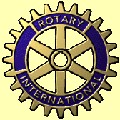Steve - Let me remember, again, we're talking about international activities, I remember Bob, you told me that you went off to Africa. I don't know if this was in connection to Rotary or what, could you give us some of the background there? Bob - Well it was partly in connection with Rotary. It was actually through an organization called Third World Eye Care but the connections they had in Kenya were through Rotary. So the, it was in Kakamanga and in Nairobi at the Rotary clubs in those cities that we were able to find the facilities, find the resources so that we could be on the ground running, up and running and to build on the point that was made earlier, it was because of Rotary's connections in those communities that we were able to make a difference in people's lives. There were four members of our club that had the privilege of being a part of the team that went to Kenya and it was living proof that, what the difference that Rotary can make in people's lives. We talked about polio, we talk about polio eradication, there's a myriad of projects that Rotary is involved in. One of the locations that we were at, north of Nairobi was an aids orphanage that was built by the Rotary club of Nairobi and it was phenomenal to see the efforts that they had made and the difference that they had made in the lives of these children. The Rotary club in Nairobi has 100 members; they have more projects going than any Rotary club in the world. They have 40 projects ongoing right now and they have 25 grants, Rotary international grants to assist them in seeing those projects through to fruition. A partner with Rotary clubs around the world, every dollar that the Rotary, is donated to Rotary, hits the ground running and makes a difference in people's lives and I think that's what sets Rotary apart from most organizations globally. So it's, and John talked about going to the Rotary club in Seoul, I went to Rotary club meetings in Africa and you're embraced when you go there. It's like you're a long, lost brother. It's a phenomenal organization. Steve - Let me ask, Neil here a question. Again, not being a member of a service club, in people's mind, there's Rotary, I mean you drive in to a town you see a list of the service clubs in that town so how would you sort of differentiate between Rotary, lion's club, Kiwanis, I mean there are a number of these service organizations. What distinguishes Rotary in your mind?
Neil - That's rather difficult for me to answer, Steve. But I, you know they are all service clubs and they all do a lot of good work, Lion's, Kiwanis, the others, they all do a lot of good things in their community. I think the one thing that I understand is different for Rotary is that it is more of an international organization. We have clubs as mentioned earlier in a number of countries throughout the world that I think that's not as true for Lion's and Kinsman Kiwanis and the others. So we are more international in nature.
Steve - Ok, let me as another question because some of the people who will be listening to this content, many live overseas and may even be members of a Rotary club for all we know, but some of them are also recent immigrants to Canada. Some of whom were business people in their own countries or professional people in their own countries and coming here in some cases, their English is not quite as good as it could, or maybe they would like it to be. How easy is it for people like this who may not be comfortable even in English? How easy would it be for them to join, let's say your Rotary and experience some of the same camaraderie and so forth in your opinion John? John - Well, gosh, that is a difficult question to answer. Although I would take one of our own members, Harrison, whose Taiwanese background, his English is, I would say, difficult to understand and yet I do remember spending, gosh I guess we were working on one of the park projects, the skate board park, and he and I were providing security services there. So it was only when we were stuck in a vehicle together for 6 hours that I really got to know this man because we actually, we conversed in spite of the fact that I had trouble understanding some of the things that he was saying and it was a very interesting experience. And, as a matter of fact Harrison has gone on to form his own, well I shouldn't say own, but a Rotarian club in Richmond with mostly Taiwanese people from what I understand. Steve - So, but, and nevertheless, it would be an opportunity for, like presumably it was for Harrison and, probably for him it was a. an opportunity to learn more about Rotary and presumably it was an opportunity to work a little bit on his communication skills. Would he be the only one in this community, in your club who is not affluent English speaker?
John - No, we've got Shawn. Steve, - Ok, on that note, on that note. We'll now move to the end of these interviews. Thank you very much.

